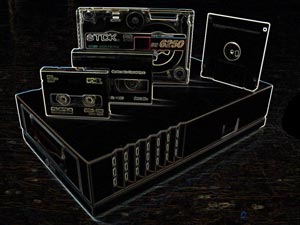Index Engines drives tape discovery downunder

Australian companies are enthusiastically adopting a new service from Index Engines that allows them find out what’s on their backup tapes without having to download the contents, according to Rod McKemmish who leads KPMG’s Forensic Technology group in Sydney.
Organisations with vast numbers of backup tapes no longer need to fear ediscovery, according to Jim McGann, vice president of information discovery, at Index Engines (US).
Headquartered in New Jersey and founded in 2003, Index Engines provides an enterprise discovery solution that scans backup tapes, indexes the contents and extracts relevant data.
The product is represented in Australia by Sententia, and also offered as a service by KPMG. An on-premise solution for a corporate or government client will cost around $US100,000 or it is offered on a per gigabyte basis by KPMG.
KPMG’s McKemish said uptake had been strong since it began offering the service in Austtralia12 months ago.
“Less than 5% of data on backup tapes is usually relevant to an ediscovery matter, and with our system you do not need to do a complete restoration, or even have the backup software,” said McGann.
“Our system just readers the header and if you have a library it can scan six tapes at once. We don’t care what format it is, as long as its connected by SCSI or Fibre Channel we can read it.”
The Index Engines platform indexes Enterprise data existing on networks, hard drives, and backup tapes.
The company recently announced it had achieved full content and metadata indexing of NetApp and HP network attached storage (NAS) data at sustained rates of up to 1 Terabyte per hour using only a single indexing node.
The NetApp performance validation consisted of Index Engines appliance connected to the NetApp FAS3170 via a direct connection of bounded GigE connections receiving eight simultaneous NDMP data streams. Data combinations of Exchange data (.EDBs and .STMs) with Files System data, Files System data only, and Exchange data only were all tested with indexing results above 1 Terabyte per hour.
The HP performance validation was configured with the Index Engines appliance direct-connected to an HP StorageWorks 9100 Extreme Data Storage System using four GigE network cables. The test data consisting of combinations of Exchange data (.EDBs and .STMs) with Files System data, Files System data only, and Exchange data only was indexed over the network using 18 simultaneous NFS crawl jobs. These crawl jobs combined for a total throughput of 1TB per hour for the single node.
"As enterprise data continues to grow, the ability to find, organise and manage that data must keep pace. Index Engines is committed to fulfilling that need with systems that remove the indexing bottleneck from enterprise discovery," said McGann.
“The indexing performance benchmark of 1 TB/hr per node brings enterprise data indexing to a whole new level. Index Engines also delivers a unified discovery platform across all network and backup data to enable efficient and cost effective electronic discovery.”
The Index Engines platform supports index and search capabilities up to one billion data objects in a single engine. It also includes support for simultaneous indexing of up to six multiple streams of data from backup tapes.
Support for major email and backup formats includes Lotus Notes email, CommVault, Symantec NetBackup, Symantec BackupExec, Legato Networker, IBM Tivoli, Computer Associates ArcServe and NT Backup.
